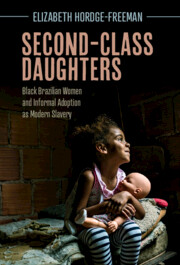Book contents
- Second-Class Daughters
- Afro-Latin America
- Second-Class Daughters
- Copyright page
- Dedication
- Contents
- Figure
- Acknowledgments
- Introduction
- 1 Adopting Modern Slavery
- 2 “Quase da Família” (Almost Family)
- 3 Prisoners of Love
- 4 Depths and Debts of Gratitude
- 5 Family Bonds and Bondage
- 6 Home Sick
- 7 Freedom to “Live Her Own Liberty”
- Conclusion
- Book part
- Works Cited
- Index
3 - Prisoners of Love
Affective Captivity and Ruptures in the Family Ideology
Published online by Cambridge University Press: 10 March 2022
- Second-Class Daughters
- Afro-Latin America
- Second-Class Daughters
- Copyright page
- Dedication
- Contents
- Figure
- Acknowledgments
- Introduction
- 1 Adopting Modern Slavery
- 2 “Quase da Família” (Almost Family)
- 3 Prisoners of Love
- 4 Depths and Debts of Gratitude
- 5 Family Bonds and Bondage
- 6 Home Sick
- 7 Freedom to “Live Her Own Liberty”
- Conclusion
- Book part
- Works Cited
- Index
Summary
In Chapter 3, the author explores the emotional and affective ruptures that offer signals to filhas de criação about their second-class status in these families. As ruptures do not always (or even often) lead to critiques of the adoptive family, she focuses on how filhas de criação identify, interpret, and respond to these moments in order to examine how they make meaning of their abuse and exploitation. She analyzes their differential responses to their adoptive family’s incongruent affective performances, and the way that they resolve them through ambiguous discourses of love and affection. As the author examines the contours of affective captivity, she shows that filhas de criação are not passive, but rather can manipulate the system of affective relations for their own ends.
- Type
- Chapter
- Information
- Second-Class DaughtersBlack Brazilian Women and Informal Adoption as Modern Slavery, pp. 88 - 115Publisher: Cambridge University PressPrint publication year: 2022

